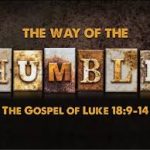Jesus began his parable thus: Two people went up to the temple area to pray…”
 So, you know this parable – you’ve heard it many times – Luke says Jesus told the people about some who trusted in themselves, who believed that they were righteous, and they treated others with contempt.
So, you know this parable – you’ve heard it many times – Luke says Jesus told the people about some who trusted in themselves, who believed that they were righteous, and they treated others with contempt.
This time around, I will leave you simply to contemplate an adaptation of an ages-old story – a modern-day parable.
It goes like this …. Three women religious – we’ll call them Sisters, but not siblings, you understand? Well, these three Sisters were praying in their monastery chapel. Two were on their knees; one sat (the picture of exhaustion).
After a short time, one Sister felt herself rising out of her body. She felt ever so holy. As she moved closer to heaven, she could see the other Sisters (poor sinners – God have mercy). She prayed for them, those poor souls!
A second Sister was ecstatic – she was caught up in a trance – she felt a vision coming on – she began to hear heavenly voices of the angel choirs singing HER praises.
The remaining Sister was filled with distractions …. She wasn’t aware if the others were sitting, standing, kneeling or bowing. Thoughts flitted everywhere! She’d never finished that memo – oh, and she’d forgotten to return that phone call. Her thoughts took off in another direction. How long it had been since she’d had a good cup coffee. Oh, what she wouldn’t give for a Dairy Queen blizzard! Or even a McDonald’s burger – or a Sonic shake. Oops, missed it again – that’s our side of the chapel praying – better tune in.
Later that night the devil’s assistant was reporting on the day’s activity. “Well,” the little apprentice devil said, “It was really quite interesting.  I was working on three of those nuns at Holy Name in St Leo. They all looked quite pious at their Evening Prayer Service. But, I suppose I failed at the job you gave me. I was successful in tempting only two of them!”
I was working on three of those nuns at Holy Name in St Leo. They all looked quite pious at their Evening Prayer Service. But, I suppose I failed at the job you gave me. I was successful in tempting only two of them!”
Reflection by Sister Roberta Bailey, OSB, Prioress
First Reading – Sirach 35:12-14, 1618 * Second Rading – 2 Timothy 4:6-8, 16-18 * Gospel – Luke 18: 9-14
Continue Reading










